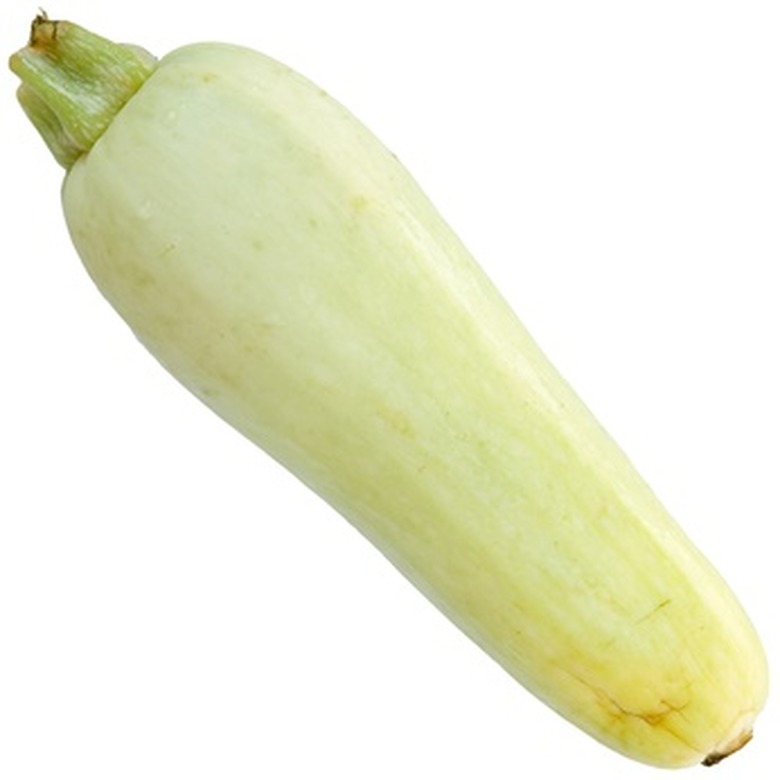Problems With Growing Summer Squash
Summer squash, as its name suggests, is a category of squash that are grown during the warmer summer months. Example types include zucchini and yellow crookneck squash. Though the specific growing needs of summer squash vary slightly according to variety, several general problems related to soil conditions, insect pests and diseases can affect your summer squash crop.
Mildew
Various types of mildews can afflict summer squash foliage during all growing seasons, but are most prevalent during the fall, according to North Carolina State University Extension. Gardeners can plant summer squash during the early summer to minimize the chances of their plants contracting this disease. Avoid getting the summer squash plant's foliage wet, and water in the morning so the sun can rapidly dry the plant. Treatment options include standard vegetable fungicides, usually copper-based sprays, available at most garden stores and nurseries.
- Summer squash, as its name suggests, is a category of squash that are grown during the warmer summer months.
- Gardeners can plant summer squash during the early summer to minimize the chances of their plants contracting this disease.
Squash Bugs
Though they may only measure 5/8 inch long, the squash bug and its larvae can cause extensive damage to your summer squash plant by feeding off of the plant's foliage. The University of Illinois Extension recommends a standard insecticide to treat this problem. Examples include sprays with bifenthrin and permethrin. Gardeners can minimize the risks squash bug infestations by planting a summer squash variety that's resistant to the insects, like 'Royal Acorn' or 'Butternut' squash, according to the Virginia Cooperative Extension.
Poor Plant Development
Summer squash need regular waterings and consistently moist soil to support proper plant growth, according to Cornell University Extension. Additionally, summer squash need full sun–six to seven hours of direct sunlight–to thrive. Gardeners can increase their soil's ability to retain moisture by stirring in a couple inches of aged compost into the dirt. Additionally, adding 3 to 4 inches of mulch can help prevent moisture evaporation.
- Though they may only measure 5/8 inch long, the squash bug and its larvae can cause extensive damage to your summer squash plant by feeding off of the plant's foliage.
- Gardeners can minimize the risks squash bug infestations by planting a summer squash variety that's resistant to the insects, like 'Royal Acorn' or 'Butternut' squash, according to the Virginia Cooperative Extension.
Cucumber Beetles
Cucumber beetles cause more than just physical damage to the summer squash plant and fruit. The beetles also carry a bacteria that causes bacteria wilt, according to the North Carolina State University Extension. Standard vegetable insecticides can be applied to control the pest. For a non-chemical control method, the University of Illinois recommends covering the summer squash plants with polyester row covers, available from most nurseries.
Summer Squash Scab
Lesions or dead spots on the summer squash fruit and plant are known as squash scabs and are caused by the Cladosporium cucumerinum fungus. Besides being aesthetically unpleasing, the disease can also provoke stunted plant growth. Cornell University Extension recommends increasing air circulation around the plant to dry them out. Fungicides like maneb and chlorothalonil can also eliminate the problem.
- Cucumber beetles cause more than just physical damage to the summer squash plant and fruit.
- For a non-chemical control method, the University of Illinois recommends covering the summer squash plants with polyester row covers, available from most nurseries.
References
- "Burpee Garden Cyclopedia: A Concise, Up-to-date Reference For Gardeners At All Levels;" Maureen Heffernan, et al.; 2002
- University of Illinois Extension: Summer Squash
- North Carolina State University Extension: Summer Squash Production
- Cornell University Extension: Summer Squash
- Virginia Cooperative Extension: Squash Bugs
